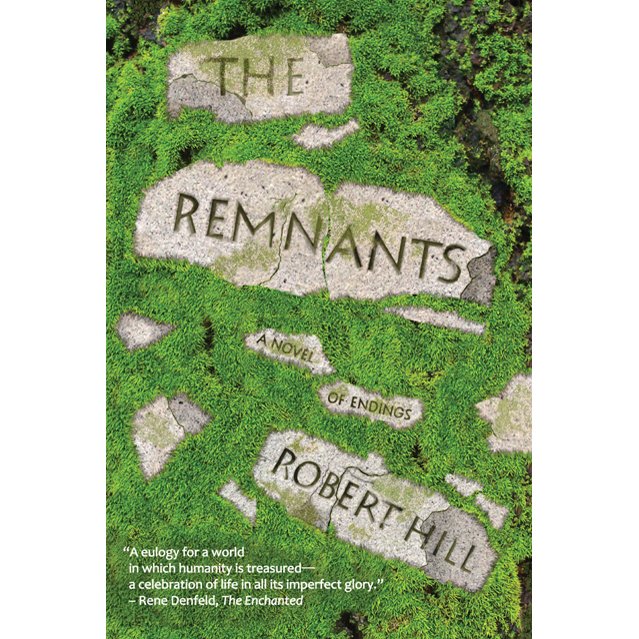The Remnants
The town of New Eden, peopled with hereditary oddities, has arrived at its last days. As two near-centenarian citizens prepare for their annual birthday tea, a third vows to interrupt the proceedings with a bold declaration. The Remnants cartwheels through the lives of wood-splitters, garment-menders, and chervil farmers, while exposing an electrical undercurrent of secrets, taboos, and unfulfilled longings. With his signature wit and wordplay, Robert Hill delivers a bittersweet gut-buster of an elegy to the collective memory of a community.
Robert’s first novel, When All Is Said and Done, published by Graywolf Press in 2006, was released in Europe by Payot & Rivages and earned critical praise from Publishers Weekly, Kirkus, Le Monde, The Olympian, The New York Sun, and Booklist’s Donna Seaman, who said, “Hill writes with velocity, rhythm, and wit, conveying a world of subtle emotions and social nuance in brilliantly syncopated inner monologues and staccato dialogue, creating a bravura and resounding performance.”
The town of New Eden, peopled with hereditary oddities, has arrived at its last days. As two near-centenarian citizens prepare for their annual birthday tea, a third vows to interrupt the proceedings with a bold declaration. The Remnants cartwheels through the lives of wood-splitters, garment-menders, and chervil farmers, while exposing an electrical undercurrent of secrets, taboos, and unfulfilled longings. With his signature wit and wordplay, Robert Hill delivers a bittersweet gut-buster of an elegy to the collective memory of a community.
Robert’s first novel, When All Is Said and Done, published by Graywolf Press in 2006, was released in Europe by Payot & Rivages and earned critical praise from Publishers Weekly, Kirkus, Le Monde, The Olympian, The New York Sun, and Booklist’s Donna Seaman, who said, “Hill writes with velocity, rhythm, and wit, conveying a world of subtle emotions and social nuance in brilliantly syncopated inner monologues and staccato dialogue, creating a bravura and resounding performance.”
The town of New Eden, peopled with hereditary oddities, has arrived at its last days. As two near-centenarian citizens prepare for their annual birthday tea, a third vows to interrupt the proceedings with a bold declaration. The Remnants cartwheels through the lives of wood-splitters, garment-menders, and chervil farmers, while exposing an electrical undercurrent of secrets, taboos, and unfulfilled longings. With his signature wit and wordplay, Robert Hill delivers a bittersweet gut-buster of an elegy to the collective memory of a community.
Robert’s first novel, When All Is Said and Done, published by Graywolf Press in 2006, was released in Europe by Payot & Rivages and earned critical praise from Publishers Weekly, Kirkus, Le Monde, The Olympian, The New York Sun, and Booklist’s Donna Seaman, who said, “Hill writes with velocity, rhythm, and wit, conveying a world of subtle emotions and social nuance in brilliantly syncopated inner monologues and staccato dialogue, creating a bravura and resounding performance.”
PRAISE FOR THE BOOK
“Reading The Remnants reminded me of Pound’s conviction ‘that music begins to atrophy when it departs too far from the dance; that poetry begins to atrophy when it gets too far from music.’ Robert Hill bridges this gulf even more directly, writing sentences that not only sing but dance, full of whisks and sways and sprightly little sidesteps of language. How would they look, I began to wonder, if you diagrammed them? Like pinwheels, I imagine. Like fireworks. Try to fasten them down and they’d still keep moving.” — Kevin Brockmeier, author of The Illumination
“Bold, brilliant, and touching, The Remnants is a eulogy for a world in which humanity is treasured—a celebration of life in all its imperfect glory.” — Rene Denfeld, author of The Enchanted
“Nobody wants to be compared to James Joyce. Especially, I’d imagine, Robert Hill. So I won’t. But in Hill’s novel, The Remnants, like Leopold Bloom, Kennesaw Belvedere wakes up one fine morning and goes forth into his beloved city. Along his way, worlds open up into worlds, stories beget stories beget stories, and characters live and breathe and die of just about every ailment in the almanac. Really you wonder how you can go on with all the living and the breathing and the dying, but Hill’s language is such a thing of rare beauty that you love every moment. And when Hunko finds Kennesaw, and Molly and Leopold are yes, of all the brilliant moments in the novel, there’s one final brilliant moment, one perfectly still moment, when all is well in a decaying world. If you love language and if you love narrative and if you love stories, don’t pass up The Remnants.” — Tom Spanbauer, author of The Man Who Fell in Love with the Moon
“Hill’s characters are so precisely written, they feel as real as you and me, despite the generations of inbreeding, which have left them somewhere off the ‘normal’ scale. Yet, these folks love and hope and yearn like the rest of us, and their stories are magical. Hill has the silver tongue of a master wordsmith. His gorgeous prose rambles from hilarious to sly to clever, and then doubles back so it can dive right off into beautiful, heartsick, and poignant. A standout story with unbelievably effective prose, The Remnants is one of my favorite 2016 titles.” — Dianah Hughley, bookseller, Powell’s City of Books
“What a lyric and wild romp of language, life, love. Reading The Remnants reminded me why I love to read, why I love to write.” — Gina Ochsner, author of The Russian Dreambook of Color and Flight and The Hidden Letters of Velta B.
“As to the meaning of this novel, with its sentences coiling around themselves like a celtic knot, I think it comes down to this: it’s a book about that most primal of urges, the urge to procreate. In The Remnants that urge runs amuck. It defies the boundaries humans have placed upon it in order that the species might not turn in upon itself. That urge carries with it the desire for connection, for a bond with another human, the two urges inextricably wound around each other, and in New Eden the possibilities are so limited that the distinctions between one family and the next have all but disappeared. The genetic results are of course calamitous, and the emotional consequences are littered across the novel’s landscape. To turn too far inward, the novel tells us, is to invite disaster.” — Stevan Allred, author of A Simplified Map of the Real World
“Wholly unexpected and unique, Hill fills his bewitching telling of the last days of a small town and its few remaining genetically compromised residents with wordplay that belies the power of connection, memory, and community.” — Elisa Saphier, lead bookseller and owner at Another Read Through
“Such extravagant, rambunctious, delicious language! And a sad and wonderful story of the end of the town of New Eden and its inbred and lyrical inhabitants. I have never read a book like this before. It defies genre.” — Cindy Heidemann, field sales at Publishers Group West
“The Remnants is a multi-sensory pleasure from start to finish, quite unlike anything you’ve read before, and a novel that will have you pondering, as I do, Hill’s next move.” — Mary Vensel White, The Rumpus
“The novel is, at heart, a bittersweet love story about left-overs of many kinds, and once a reader trusts the strange terrain, it feels like our own.” — Julian Anderson, Fiction Writers Review
“It is for aficionados, for readers who let sentences dissolve blissfully on their tongues, for those who can’t help but swoon over the playful and well-executed marriage of high diction to character names like Intermediate Hurlbutt and Righteous Whiskerhooven. It’s a masterpiece meant not for plot-lovers, but for literati on the search for an uncommon satisfaction.” — Brandi Dawn Henderson, PosLit
“Fans of Margaret Atwood will love the dystopian end-of-the-world themes, older readers will appreciate the elderly protagonists, literary fiction lovers will connect to the clever word play, and others will love the juxtaposition of humor with dark themes. A most original novel!” — Sarah H., Book People’s Book Club Corner
“Hill’s text reads like poetry spoken in a long Southern drawl. You could read this book on the porch with a mint julep and a heartache. And the names! Carnival, Jubilee, Frainey, Hunko. Each character is their own ecosystem, like finches on Galapagos, cut off from the continent. Hill likens them to jellyfish, Egyptians, and clay. They are spinning in their own orbits, watching the sun fade.” — Stephanie Bonjack, Lit Reactor
BOOK INFORMATION
TITLE: The Remnants
AUTHOR: Robert Hill
FORMAT: Paperback (6" x 9")
PAGES: 272
ISBN: 9781942436157
PRICE: $15.95
PUBLISHER: Forest Avenue Press
PUBLICATION DATE: March 15, 2016
ABOUT THE AUTHOR
Robert Hill is a New Englander by birth, a west coaster by choice, and an Oregonian by osmosis. As a writer, he has worked in advertising, entertainment, educational software and not-for-profit fundraising. He is a recipient of an Oregon Literary Arts Walt Morey Fellowship and a Bread Loaf Writers’ Conference Fellowship. The Remnants follows When All Is Said and Done (Graywolf, 2006), Robert’s debut novel, which was shortlisted for the Oregon Book Awards’ Ken Kesey Award for Fiction.
The Remnants was named a Best Book
to Read Before You Die, Pacific Northwest
edition, by Powell’s Books and it was a
Book People Book Club pick.


